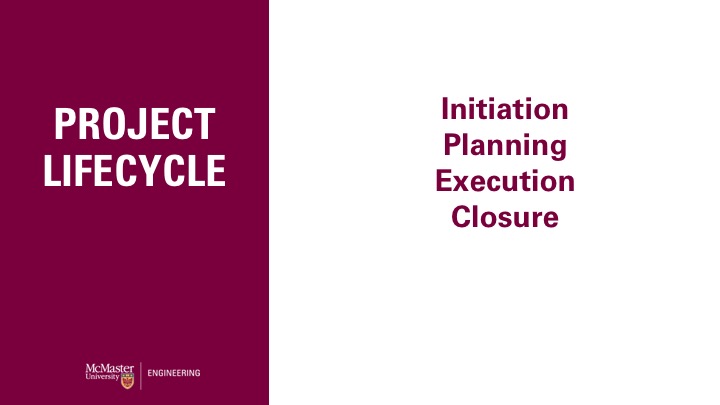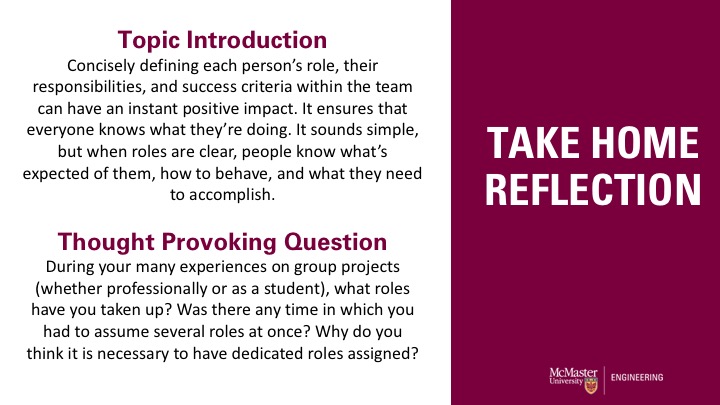19 Mentor Training Module 3: Roles Within The Project Lifecycle

Welcome to the third module in the mentor training! The topic we’ll be going through now is titled the roles within the project lifecycle.
 To begin, we’ll be going through the many different roles a mentor can take on. First off, the educator. You’re there to help guide your groups the same way a teacher guides their students. While you may not be giving lectures, you’re there to help them develop a better project and to further explain core concepts associated with the short-duration learning experience. Your goal as a teacher should always be to help your participants achieve their full potential.
To begin, we’ll be going through the many different roles a mentor can take on. First off, the educator. You’re there to help guide your groups the same way a teacher guides their students. While you may not be giving lectures, you’re there to help them develop a better project and to further explain core concepts associated with the short-duration learning experience. Your goal as a teacher should always be to help your participants achieve their full potential.
Next is the collaborator. It’s crucial to be a strong leader in a group setting. You want to be able to not only collaborate with your own groups, but with your fellow mentors for presentations, taking on side tasks, or whatever may require a team approach.
The manager role is the most common as you are the one managing the groups. Think of yourself as a coach in the major leagues. You have a group of talented athletes with their own strengths in their game. At the end of the day, championships are won by strategies and techniques set up by the management. Your management style can help your groups be the best they can, just assess how much intervention is needed at any given time.
Next is the empathizer. I’m sure you have heard about empathy a few times by now so we can keep it quick. We need to keep empathy high and ensure it is shared with our students so they feel heard and recognized. Try to put yourself in the shoes of your participants so that you can best understand where they are coming from and where they need to go next.
Finally, the critic is more so based on the fact that you will be assessing their work. While you may not be assigning formal grades to participants, you will be providing them with feedback to help them build the best project they can.

Moving on to the project lifecycle. We’ll be using this four step methodology for each deliverable associated with the short-duration learning experience. The four steps are initiation, planning, execution, closure. We will be going through each individually and talk about the participant roles and mentor roles.

First off is the initiation stage for the participants. In some projects, participants will be encouraged to identify their project scope, outline their final deliverables, and identify stakeholders. They need to identify project risks or any areas they may need help moving forward so they can make sure they can get the resources they need from our team. Finally, teams will need to create an initial plan to move forward with so they can complete the deliverable to the best of their abilities.
 Now we will review the role of the mentors during the initiation stage. Your responsibilities here are to double check if the participants scope is feasible for the project. Make sure they identify all of their stakeholders. Failing to consider who their intended stakeholders are could prevent the team from hearing important opinions or from understanding how their problem might impact others. Finally, give feedback on the initial proposal if need be. This can help you map out how their future deliverables will look and if you think any interventions are necessary.
Now we will review the role of the mentors during the initiation stage. Your responsibilities here are to double check if the participants scope is feasible for the project. Make sure they identify all of their stakeholders. Failing to consider who their intended stakeholders are could prevent the team from hearing important opinions or from understanding how their problem might impact others. Finally, give feedback on the initial proposal if need be. This can help you map out how their future deliverables will look and if you think any interventions are necessary.
 The next step is planning. During this stage, participants will create and assign tasks for the deliverable to come, creating short term SMART goals (like we discussed in the accountability module), and identifying which group member is capable of completing specific tasks. By doing all three, participants will be setting themselves up for short term success.
The next step is planning. During this stage, participants will create and assign tasks for the deliverable to come, creating short term SMART goals (like we discussed in the accountability module), and identifying which group member is capable of completing specific tasks. By doing all three, participants will be setting themselves up for short term success.

If the groups are struggling in the assigning tasks phase, it would be your responsibility as a mentor to help them delegate the tasks. When doing so, make sure you are logical in your choices as one task may be appropriate for one student but maybe not another. As such, encourage the participants to share their strengths, weaknesses, and their personal goals for the program. Next, track their SMART goals. You may want to suggest students use a project management software like Trello or Miro. These tools that help tracking progress in the short-term and on their overall project. Ensure you have access to these tools and it will be easy to keep an eye on whether the group is staying on track.

Once the planning is done, the participants will be moving onto the execution stage. They will be mobilizing their project plan here. This should have been creating the deliverable in the planning stage. They should be pushing constant communication as that is what will help them get through the execution of it all. They need to be able to work together, hence the term group work. Finally, it is time to get to work! There is nothing more to it.

For you, the mentor, you should be monitoring the project execution. You shouldn’t be micromanaging the teams, but you should be knowledgable about how the project development is coming along. It is really easy to get a little too creative and absolutely erupt the scope of the project, so being able to keep your groups in line during their deliverable process will help in creating a feasible bigger picture. Like the students, you should also have constant communication with your groups. In the perfect world, the students will come to you when they need help. However many participants will feel embarrassed or nervous if projects they experience a problem, so you may need to reach out to your groups during this stage to ensure everything is going well. Finally, give feedback along the way. Try to give as detailed information about what the team is doing well in addition to letting them know about opportunities for improvement.

The last stage is closure, the participants will be in charge of handing in deliverables. They should be assessing how well they worked together and making sure they have next steps outlined in case there was any conflict.

For the last stage for the mentors, you will be providing feedback on their deliverable and ensuring they are on the right track in the short term and the long term. Finally, you will also assess their group dynamics and ensure there is no room for conflict moving forward.

Finally, the activity! Your group is working to assemble a work plan to move forward. They are currently working on a shared Google Doc and verbally accepting roles. What stage are they in and what advice would you give your group?

Thank you for completing the third mentor training module, roles within the project lifecycle. Take time to reflect on your experiences in a group projects (whether professionally or as a student). What roles have you taken up? What made the experience successful? What could have made the experience better?
References
Cothran, D., McCaughtry, N., Smigell, S., Garn, A., Kulinna, P., Martin, J. J., & Faust, R. (2008). Teachers’ preferences on the qualities and roles of a mentor teacher. Journal of Teaching in Physical Education, 27(2), 241-251. https://doi.org/10.1123/jtpe.27.2.241
Blaine Lawlor, K. (2012). Smart Goals: How the Application of Smart Goals can Contribute to Achievement of Student Learning Outcomes. Developments in Business Simulation and Experiential Learning, 39. https://journals.tdl.org/absel/index.php/absel/article/view/90
Valkenburg, R., & Dorst, K. (1998). The reflective practice of design teams. Design Studies, 19(3), 249-271. https://doi.org/10.1016/s0142-694x(98)00011-8
Westland, J. (2007). The project management life cycle: A complete step-by-step methodology for initiating, planning, executing & closing a project. Kogan Page Publishers. https://books.google.ca/books?hl=en&lr=&id=Jb03AAAAQBAJ&oi=fnd&pg=PP1&dq=project+life+cycle+initiation+planning+execution&ots=66ccLF0vbs&sig=c_gjZWNMw2Vpbyf7EYkobj3lB2Q#v=onepage&q=project%20life%20cycle%20initiation%20planning%20execution&f=false

